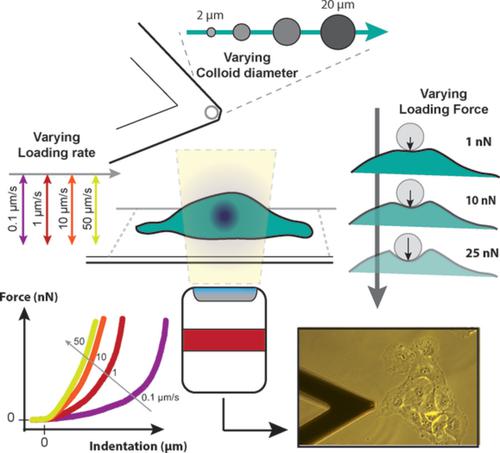当前位置:
X-MOL 学术
›
Microsc. Res. Tech.
›
论文详情
Our official English website, www.x-mol.net, welcomes your feedback! (Note: you will need to create a separate account there.)
Measuring (biological) materials mechanics with atomic force microscopy. 2. Influence of the loading rate and applied force (colloidal particles)
Microscopy Research and Technique ( IF 2.5 ) Pub Date : 2020-11-12 , DOI: 10.1002/jemt.23643 Andreas Weber 1 , Barbara Zbiral 1 , Jagoba Iturri 1 , Rafael Benitez 2 , José L Toca-Herrera 1
Microscopy Research and Technique ( IF 2.5 ) Pub Date : 2020-11-12 , DOI: 10.1002/jemt.23643 Andreas Weber 1 , Barbara Zbiral 1 , Jagoba Iturri 1 , Rafael Benitez 2 , José L Toca-Herrera 1
Affiliation

|
Atomic force microscopy (AFM) is the most often used tool to study the mechanical properties of eukaryotic cells. Due to their complex assembly, cells show viscoelastic properties. When performing experiments, one has to consider the influence of both loading rate and maximum load on the measured mechanical properties. Here, we employed colloidal particles of various sizes (from 2 to 20 μm diameter) to perform force spectroscopy measurements on endothelial cells at loading rates varying from 0.1 to 50 μm/s, and maximum loads ranging from 1 to 25 nN. We were able to determine the non‐linear dependence of cell viscoelastic properties on the loading rate which followed a weak power law. In addition, we show that previous loading at high forces leads to a stiffening of cells. Based on these results we discuss a road map for determining cell mechanical properties using AFM. Finally, this work provides an experimental framework for cell mechanical measurements using force‐cycle experiments.
中文翻译:

用原子力显微镜测量(生物)材料力学。2. 加载速率和施加力的影响(胶体颗粒)
原子力显微镜 (AFM) 是研究真核细胞力学性能最常用的工具。由于它们的复杂组装,细胞表现出粘弹性。在进行实验时,必须考虑加载速率和最大载荷对测量的机械性能的影响。在这里,我们采用各种尺寸(直径从 2 到 20 μm)的胶体颗粒对内皮细胞进行力谱测量,加载速率从 0.1 到 50 μm/s 不等,最大载荷范围从 1 到 25 nN。我们能够确定细胞粘弹性特性对遵循弱幂律的加载速率的非线性依赖性。此外,我们表明先前在高力下的加载会导致细胞变硬。基于这些结果,我们讨论了使用 AFM 确定细胞机械性能的路线图。最后,这项工作为使用力循环实验的细胞力学测量提供了一个实验框架。
更新日期:2020-11-12
中文翻译:

用原子力显微镜测量(生物)材料力学。2. 加载速率和施加力的影响(胶体颗粒)
原子力显微镜 (AFM) 是研究真核细胞力学性能最常用的工具。由于它们的复杂组装,细胞表现出粘弹性。在进行实验时,必须考虑加载速率和最大载荷对测量的机械性能的影响。在这里,我们采用各种尺寸(直径从 2 到 20 μm)的胶体颗粒对内皮细胞进行力谱测量,加载速率从 0.1 到 50 μm/s 不等,最大载荷范围从 1 到 25 nN。我们能够确定细胞粘弹性特性对遵循弱幂律的加载速率的非线性依赖性。此外,我们表明先前在高力下的加载会导致细胞变硬。基于这些结果,我们讨论了使用 AFM 确定细胞机械性能的路线图。最后,这项工作为使用力循环实验的细胞力学测量提供了一个实验框架。


























 京公网安备 11010802027423号
京公网安备 11010802027423号